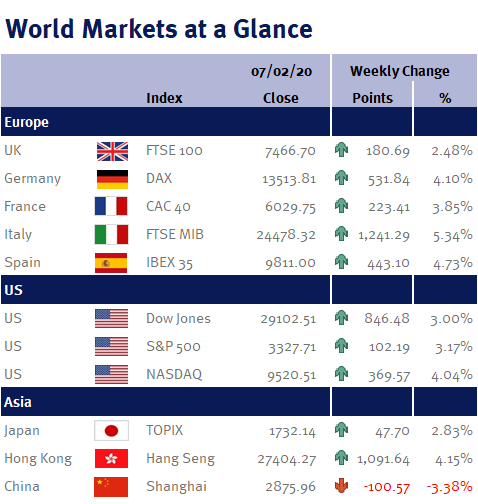Rising fears about the economic impact of coronavirus hurt global equity markets this week. China’s equity market ended up being closed all week as the Lunar New Year holiday was extended because of the coronavirus – no doubt Monday (3 February 2020) could look ugly as they play catch-up.
Week ending 31st January 2020.
3rd February 2020

While we appreciate that coronavirus is dominating news headlines and the resulting equity market weakness is unnerving, it doesn’t mean you should react to every development. In fact, we saw a great example yesterday (Thursday 30 January 2020) when Carnival (a cruise ship operator) fell over 11% and wiped billions of pounds from its market value, due to a suspected case of coronavirus onboard one of its ships. However, when it turned out to be a normal bout of flu, the shares quickly rebounded!
While we aren’t trying to make light of the horrible human tragedy, for equity markets this is likely to be a transient worry, just like SARS, swine flu, MERS, Zika virus and Ebola.
Consequently, it is important to maintain a long-term perspective and resist the urge for any knee-jerk reactions because, if history is repeated, there is a reasonable chance we will see a V-shaped recovery in equity markets as soon as we get greater clarity on the spread of the coronavirus and the current fears dissipate.
In the UK, Mark Carney, the BoE governor, yesterday (Thursday 30 January 2020) gave his final monetary policy decision and quarterly briefing as he is being replaced by Andrew Bailey in March 2020.
True to form with his “unreliable boyfriend” nickname, UK interest rates were left unchanged, in spite of the fact that Mark Carney recently hinted during a speech that interest rates would be cut to boost the economy. In the end, only two BoE policymakers voted for an interest rate cut, despite the fact that the BoE downgraded its UK economic growth forecasts!
The BoE now thinks the UK economy will grow by 0.75% in 2020 and 1.5% in 2021, down from its earlier estimates of 1.25% and 1.75% respectively. Furthermore, inflation is only expected to reach its 2% target in Q1 2022 and will only be 2.1% in Q1 2023 – so by no means out of control.
In the US, as expected the Fed left US interest rates unchanged. However, during the press conference the Fed Chair, Jerome Powell, flagged that the coronavirus outbreak poses a risk to the economic outlook and stressed the importance of lifting inflation to their 2% target – which suggests to us that the bar for cutting US interest rates is now lower than for raising interest rates.
Elsewhere, commodity prices extended their declines on concern the coronavirus will lower demand. For example, the price of a barrel of Brent crude fell another 6% despite geopolitical tensions (Libya’s power struggle may halt production, while in Iraq, Baghdad’s Green Zone was again attacked with rockets).
US employment data (non-farm payrolls; unemployment rate; participation rate; and average earnings) on Friday (7 February 2020) is the main economic data release for this coming week.
We are also rapidly approaching the tax year end and so we would like to remind you that if you have not already taken advantage of your ISA allowance, now is the time to act. The current limit is £20,000 and if you don’t use it by 5 April 2020, you will lose it. Contact us using the details found in your email to start the process.
Investment Management Team
The latest market updates are brought to you by Investment Managers & Analysts at Wealth at Work Limited which is a member of the Wealth at Work group of companies.
Links to websites external to those of Wealth at Work Limited (also referred to here as 'we', 'us', 'our' 'ours') will usually contain some content that is not written by us and over which we have no authority and which we do not endorse. Any hyperlinks or references to third party websites are provided for your convenience only. Therefore please be aware that we do not accept responsibility for the content of any third party site(s) except content that is specifically attributed to us or our employees and where we are the authors of such content. Further, we accept no responsibility for any malicious codes (or their consequences) of external sites. Nor do we endorse any organisation or publication to which we link and make no representations about them.

